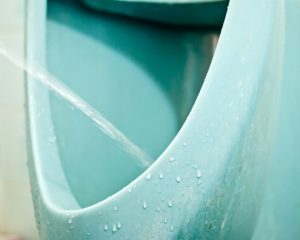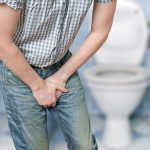 Bladder problems are usually a subject for discussion in relation to women, but bladder issues can very much affect men, too, especially those over the age of 60. With aging, the risk of bladder-related problems increases, as there is a decline in kidney weight over time. The bladder and the urethra, too, undergo changes associated with aging, which together can lead to problems in the urinary tract system.
Bladder problems are usually a subject for discussion in relation to women, but bladder issues can very much affect men, too, especially those over the age of 60. With aging, the risk of bladder-related problems increases, as there is a decline in kidney weight over time. The bladder and the urethra, too, undergo changes associated with aging, which together can lead to problems in the urinary tract system.
For men, specifically, bladder problems are often linked to changes in the prostate, which can become enlarged blocking the flow of urine. If left untreated, an enlarged prostate can cause urinary retention, which can go on to harm the kidneys.
Advertisement
Here we will outline three common bladder problems men over the age of 60 are at risk for. These include urinary incontinence, overactive bladder, and an enlarged prostate.
Overactive bladder in men
Overactive bladder can be described as frequent urination, a constant urge to urinate, bladder leaks, and nighttime urination. Nearly 33 million Americans live with overactive bladder and 30 percent of the patients are men.
Symptoms of overactive bladder in men include an urgent need to urinate, frequent urination (more than eight times a day), nighttime urination, and a strong urge to urinate, which can lead to bladder leaks.
For men, overactive bladder is often triggered by an enlarged prostate. As men age, the prostate can become larger, blocking the flow of urine, and lead to other symptoms related to overactive bladder.
Prostate enlargement isn’t the only cause of overactive bladder in men. Other causes include a bladder infection, bladder stones, or bladder cancer. Fluid intake, medications, and constipation can all be temporary causes for overactive bladder in men as well.
Urinary incontinence in men
 Uncontrollable urination or urinary incontinence occurs in eleven to 34 percent of older men, but it is not just an age-related issue. Younger men can also experience incontinence due to health problems. Urinary incontinence also happens to women, but the biggest issue with incontinence in men is that they are less likely to speak with their doctors about it. This means that the statistics for men could actually be much higher in men that the current numbers indicate. Discussing the problem is the first step towards addressing the symptoms and finding a treatment.
Uncontrollable urination or urinary incontinence occurs in eleven to 34 percent of older men, but it is not just an age-related issue. Younger men can also experience incontinence due to health problems. Urinary incontinence also happens to women, but the biggest issue with incontinence in men is that they are less likely to speak with their doctors about it. This means that the statistics for men could actually be much higher in men that the current numbers indicate. Discussing the problem is the first step towards addressing the symptoms and finding a treatment.
Urinary incontinence often results in the accidental leakage of urine from the body, so it can be uncomfortable and inconvenient. A man can feel a strong, sudden need to urinate just before losing a large amount of urine. Doctors refer to this as urgency incontinence. For some people, this condition keeps them from enjoying certain activities, including sports and exercise. It can also cause a lot of emotional distress as well.
There are different types of urinary incontinence. The types of urinary incontinence men can experience include urgency incontinence, stress incontinence, functional incontinence, overflow urinary incontinence, and transient urinary incontinence.
We have already established what urgency incontinence is. Stress incontinence is leakage when a man coughs, laughs, sneezes, or overexerts himself. Functional incontinence is when physical or emotional disability prevents a person from getting to the washroom in time. Overflow incontinence is when the bladder fails to empty properly and later overflows, while transient incontinence is a temporary form of urinary incontinence. It is usually an effect of certain medications.
Enlarged prostate problems in elderly
Benign prostatic hyperplasia (BPH) is a non-cancerous enlargement of the prostate. There are two prostate growth periods: one during early puberty and another around the age of 25. As it grows, the gland can press and pinch the urethra, and the bladder walls thicken. Over time, the bladder can become weaker and lose its ability to empty fully. If the urethra continues to narrow and the bladder still can’t empty, complications associated with benign prostatic hyperplasia can arise.
Benign prostatic hyperplasia does not increase a man’s risk of developing prostate cancer. Prostate cancer begins in the outer peripheral zone and grows outward to invade surrounding tissue. In BPH, the growth moves inward, towards the prostate’s core, causing the urethra to become tighter and making it difficult to urinate.
The growth dynamics of BPH and prostate cancer determines the symptoms. BPH can have annoying symptoms, such as the inability to urinate or releasing a small amount only. Prostate cancer is referred to as a silent killer because its symptoms can take months or years to appear.
Hormonal changes that occur through aging contribute to the BPH onset. Genetics, too, can be a possible cause of BPH. The prostate continues to grow from the age of 25, but when the prostate grows too much, it can cause complications in older men.
Signs and symptoms of an enlarged prostate include:
- Difficulty urinating
- Constant urge to urinate
- Increased urination at night
- Weak urine stream
- Dribbling at the end of urination
- Straining while urinating
- Inability to empty bladder fully
There are a variety of treatments available for an enlarged prostate. Your doctor can recommend the most appropriate option for your condition.
Lower urinary tract symptoms
 Lower urinary tract symptoms arise as a result of problems with the lower urinary tract, including the bladder, prostate, and urethra. Symptoms can be categorized as either voiding symptoms or storage symptoms.
Lower urinary tract symptoms arise as a result of problems with the lower urinary tract, including the bladder, prostate, and urethra. Symptoms can be categorized as either voiding symptoms or storage symptoms.
Voiding symptoms include:
- Hesitancy to release urine
- Weak and poorly directing stream of urine
- Straining to urinate
- Dribbling after urination
- Chronic urinary retention
- Overflow of urine
Advertisement
Storage symptoms include:
- Strong urgency to urinate
- Greater frequency when urinating
- Nighttime urination – nocturia
- Urge incontinence
If you’re a male over the age of 60 and are experiencing any of the above symptoms, you don’t have to suffer in silence. Speak to your doctor to uncover the underlying cause of your bladder problems so that your doctor can implement a treatment plan to help improve not only your bladder problems but overall quality of life.
Also Read : Natural remedies and exercises for enlarged prostate (benign prostatic hyperplasia)
